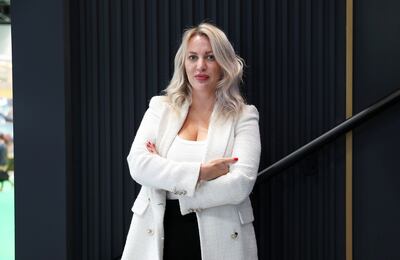Hoteliers in the UAE and the region have reported an increase in long-term bookings as people mix work and play during their holidays.
Experts at the Arabian Travel Market told The National that employees were taking advantage of a new flexible work culture that evolved during the pandemic and opting for "workcations" this summer.
This is despite rising air ticket prices caused by high travel demand and fuel costs.
“We are seeing a lot more people booking workcations this summer,” said Caroline Jonsson, Radisson Hotels’ communication manager for the Middle East.
Radisson Hotels
“They will be spending longer than they usually would on their summer vacation but that’s because they will be combining it with work.
“Companies are much more flexible than they were before the pandemic about trusting their staff to work remotely.”
She said that people were feeling pent up after not being able to travel far during the pandemic, adding to the desire to take longer holidays now restrictions were eased in many countries.
The price of a month-long stay at a hotel apartment in Dubai varies depending on the property.
A month at the Leva Hotel, recently named the emirate's best-reviewed property on Trip Advisor, will cost just under Dh9,000, according to booking.com.
However, the same stay at Dubai's Palazzo Versace will set you back close to Dh35,000.
Hampton by Hilton on Marjan Islands, where two connecting rooms are available and sleep up to eight people, is for Dh599 per night.
A recent report from travel firm Wego showed there had been a significant increase in the number of people booking working holidays.
The company reported there has been an increase of 136 per cent for online searches for holiday homes, a 92 per cent rise in hotel apartments and a 69 per cent increase in apartments.
Wego says there is also a 19 per cent rise in the duration of a stay, with the average holiday booked on the platform being for 22 days.
The study was based on the responses of almost 4,400 people living in the UAE and Saudi Arabia.
“People are flying out for longer because they want to make up for lost time from sitting at home in the pandemic,” said Ross Veitch, chief executive of Wego.
“There’s an attitude as well that if they’re going to go through the pain of what’s involved in the logistics of travel, then they’re going to make the most of it as restrictions have eased a little bit now.
“We’re seeing people mixing business with pleasure and working while on vacation. Some of my own staff were working from Bali recently, for example.”
Mr Veitch said there was also a trend of people returning to their home countries for extended stays.
“Employers have given them that flexibility to spend time connecting again with family while still remaining on the job,” he said.
“If you are a professional white-collar worker right now, I would say the world is your oyster.
“It’s not unusual for someone to fly out of the UAE and park themselves somewhere in the Mediterranean but stay connected to the workplace.”
There was another trend that emerged in the pandemic, he added.

“There were an awful lot of people who came to Dubai to work from here,” he said.
“There were many who booked long-term hotel stays on the back of that.
“The trend of people looking for long-stay accommodation beyond the traditional hotel stay is going to continue as well.”
The rise of people mixing business with pleasure when it comes to travelling is becoming more of a common sight than before the pandemic, said a senior officer from Hilton.
“The whole perception of work being based in only one place is gone,” said Jochem-Jan Sleiffer, Hilton’s president for the Middle East, Africa and Turkey.
“It’s much more fluid nowadays than going into an office on a Monday and finishing on a Friday.
“There is mutual trust as the employer looked after the employee during the pandemic and, in turn, the employee delivered the work.”
He said this meant employers had fewer issues with staff taking longer vacations while also working for part of that time.
“It’s been a difficult time for a lot of people working at home with personal problems and not being able to fly home to see their families,” said Mr Sleiffer.
“The pandemic also meant people were reassessing what was important in their lives and realising family time was very important.”
Another trend is that people are travelling in larger groups than before the pandemic, said Mr Sleiffer.
“People used to just travel in pairs but now we are seeing more cases when they are in groups of six to eight,” he said.
“The reason for this was they have saved a lot of money during the pandemic and now want to go on the trip of a lifetime.
“People used to just travel together with children but now they are taking grandparents and other family members along.”






































